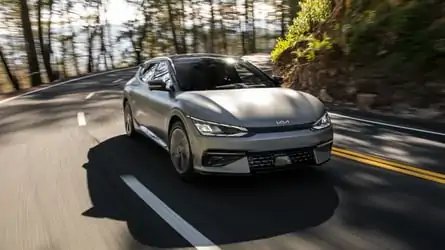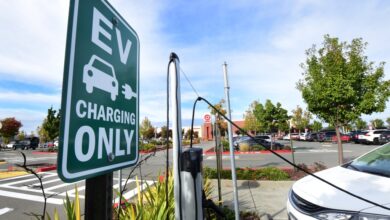EV Lease Prices Could Rise Due To Poor Resale Value: Study

A new study warns that rapidly declining residual values of used EVs could lead to higher lease prices over the remainder of the year.


The poor residual value of EVs could contribute to lower or slower overall adoption. That’s no surprise, especially since consumers have become hyper-aware of used EVs rapidly dropping in value over their first few years of ownership. And while buyers are the most hurt by depreciation, it turns out that lessees aren’t exactly free from the pain either.
The newest study comes from J.D. Power in its Automotive Leasing Guide—a guide revised every two months that helps lenders know what to expect a vehicle’s residual (or future) value to be at the end of a lease term. J.D. Power can closely monitor the used market and wholesale auctions to determine these values.
Why So Many People Are Leasing EVs
Leasing an EV is a very low-risk deal for many buyers. Not only do they get to try before they buy, but they put all of the long-term maintenance risks onto the lender. The potential risk of being stuck with a depreciating car when “next-gen” EVs are released is also a non-issue, as the car can simply be returned at the end of its lease. For many, this equates to skipping the early-adopter tax altogether.
A lease is a great way to introduce someone to their first electric car. Automakers are offering some mind-blowing good deals on leases, which makes right now a perfect time to be in the market for a new EV. But that could change once lenders learn just how much of a bath they’re taking in residual values with the newest iteration of the ALG. According to Automotive News, the guide has projected cuts in residual values for EVs across the board, meaning leasing could get a bit more expensive in the third quarter of 2024.
Before we proceed, let’s understand what exactly affects the lease price. Generally, this number is the result of depreciation—that is, the difference between the price of the vehicle and its projected residual value at the end of the lease. Other details are also factored in, like any incentives and the money factor. Monthly payment is a huge factor when buying a new car, and if residual values keep dropping, the monthly payment could rise.
This isn’t the first time poor resale value has threatened EV adoption. A recent study by ISeeCars revealed that the average price of a used EV fell 31.8% year-over-year, a huge delta compared to the average combustion-powered car dropping just 3.6%. Karl Brauer, executive analyst at iSeeCars, says residual value loss could dissuade shoppers from buying a new EV.
The finger points at Tesla for the market shift, despite the Chevy Bolt, Nissan Leaf, and Kia Niro being the highest depreciating vehicles. However, the new market followed after Tesla slashed prices on the Model 3 sedan and Model Y crossover. This also pushed used values down, especially as huge fleet owners like Hertz began to offload their cars for incredibly cheap prices.
The good news is that leasing an EV allows one to avoid the direct effects of residual losses. Sure, monthly payments are ultimately calculated based on the projected residual value of the vehicle at the end of the lease. However, automakers and lenders can offer some pretty decent incentives, especially given the $7,500 tax credit loophole that otherwise-disqualified vehicles become eligible for through a lease.
It also helps to ease the minds of drivers who are not ready to commit to the full purchase price of an EV. Consumers get a try-before-you-buy deal to see how driving a battery-powered car affects their daily lives and transfer the risk of long-term EV ownership to the lender. That means any uncertain maintenance concerns, such as replacing the traction battery, become a non-issue for a short-term lease. However, recent studies show that particular problem is low-risk regardless.
Read more



